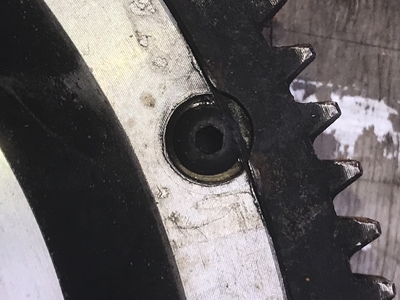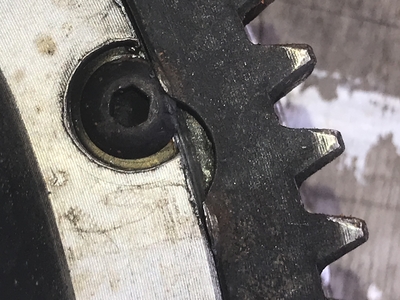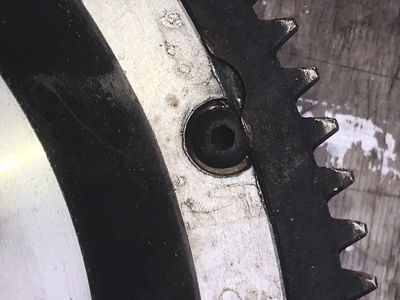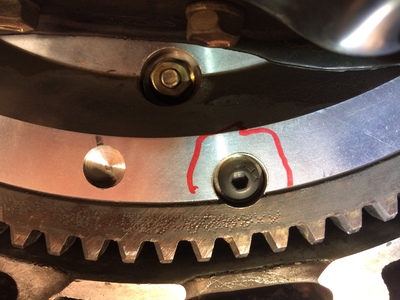Over at SC, I wrote at length how a new three piece Fidanza Lightweight Flywheel had failed after approximately 4 months of very light duty driving. (ABSOLUTELY no spirited driving!) What failed exactly is the ring gear attachment to the flywheel. In my car's case, the ring gear could be pushed back and forth to the distance of several teeth from below the car when the engine was turned off.
Given that "A Picture Can Be Worth A Thousand Words," I have attached three close up photos of the ring gear, after the flywheel was taken off of my car's engine.
Somewhat normal:
Slipped to the right:
Slipped to the left:
What alerted me to the flywheel failure was both unusual vibration at idle, as well as an unusual sound coming from the engine compartment when the car was operated under normal driving conditions.
Fidanza was alerted to my flywheel failure, but, at the time refused to assist me in removing the old one and/or installing a new one. Instead Fidanza cryptically offered to "Have me take the flywheel off. Ship it to Fidanza. After their inspection, depending upon their findings, they MIGHT do something about the failure." Needless to say, I was very underwhelmed with Fidanza's unacceptably poor customer service.
Questions? I will be happy to offer whatever I can by way of explanation or description.
P.S. From the amount of wear visible on the ring gear's retaining screws, it would have been only a short period of time before the ring gear would have spun freely; leaving me possibly stranded, with push starting the vehicle as the only way to start the car.
Paul
Holy moly.
2000 Toyota MR2 Spyder, 2021 Lexus UX 250h F Sport
You’re scaring me, paul.
I better take a look at the wife’s car since driving it and noticing a strange sound. I was thinking it sort of sounded like a bad wheel bearing. IIRC, it only made the noise around 40 mph while cruising. My wife couldn’t hear it bit it drove me crazy. My hearing isn’t that great but I always hear the lower frequency sounds that she doesn’t pick up on.
what replacement flywheel are you going to use? And thanks a lot for posting this.
Damn, too bad you have to go through this, but very glad you found the issue, are fixing it, and sharing your experience.
Mono Craft GT-300 with a few upgrades...
Interesting find. I haven't had that happen to me that I'm aware of, but I will be sure to check next time I have mine up in the air.
Get your Short Antennas, Decals, and all sorts of goodies at:
https://takubanmotorsports.com
From what I have read on other forums it would appear its one of those things that it either happens early on or it doesn't happen. Apparently both the aluminum and steel ring cools at different rates and if the initial heat and cool cycle doesn't agree for whatever reason it will separate and those rivets are the only thing holding it on. I don't believe those rivets are there for redundancy.
I would think they would want to heat cycle the flywheel before they are sold as part of the quality control process.
I would think it’s a tolerance issue. It’s an interference fit where the steel ring is slightly smaller than the aluminum diameter. One thing I noticed with mine when installing was the centering hole was way sloppy so the flywheel sat in the freezer for several hours before quickly fastening it to the crank, just to shrink it up a bit. Still wasn’t snug but helped. Again a tolerance issue. Bad quality control?
I would think it’s a tolerance issue. It’s an interference fit where the steel ring is slightly smaller than the aluminum diameter. One thing I noticed with mine when installing was the centering hole was way sloppy so the flywheel sat in the freezer for several hours before quickly fastening it to the crank, just to shrink it up a bit. Still wasn’t snug but helped. Again a tolerance issue. Bad quality control?
I think its a metallurgy issue. That just my best educated guess. When the gear is fitted to the aluminum by means of a heat pressure fit there is probably something in the process of forging the aluminum or steel that caused the tolerance after the flywheel went though a heat cycle.
I imagine that this probably happens with all aluminum flywheels where they will loosen a little but not enough to come out of acceptable tolerance.
Incidentally on a relatable subject I installed a Rimflex exhaust gasket that does not need re-torquing after a heat cycle. As it cools there is enough spring in it to make sure it keeps tension so there are no leaks as long as you follow their directions for exact torque.
Could be a metallurgical issue or just being of dissimilar metals since contraction and expansion rates are different, although this would be true of all their flywheels then.
There is also the repeat ability of a machine to factor in and the operator taking measurements, changing out of cutting tool, etc.
One thing I'm curious about is what type of clutch Paul was using, OEM or aftermarket?
When I did the engine and tranny swap, I put in OEM Toyota clutch and flywheel. Additionally, in the hopes of increased clutch longevity, both the clutch and the pressure plate were spec'd for the 2ZZ; not the installed 1ZZ NA.
Paul
I used a 2zz pressure plate and a 1zz disc on my 1zz SMT. I wasn’t sure about using a 2zz disc on the 1zz since the part numbers are different and so are the flywheels. Did you notice any difference between the 1zz disc and the 2zz disc? Did your pedal feel any different?
Clutch pedal feel is exactly the same as it was with the 1ZZ clutch and pressure plate.
For the minimal increase in cost, I thought the upgrade made a lot of sense.




